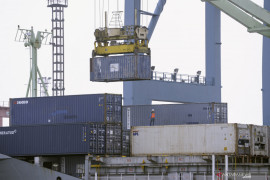"Looking ahead, BI will always strengthen its synergy with the government and relevant authorities to improve external resilience, including the prospects of the trade balance's performance," Executive Director of the BI Communication Department Onny Widjanarko noted in a statement released on Monday.
The rise in imports of consumer goods in January 2020 demonstrated that the people's purchasing power remained under control, he stated.
In the meantime, the rise in the import of capital goods mirrored the economic agents' confidence in the positive prospects of the Indonesian economy, he added.
BI recorded that the country's trade balance had suffered a deficit of US$0.86 billion in January 2020 as compared to $0.06 billion a month earlier.
The rise in trade deficit was particularly fueled by the declining surplus from non-oil/non-gas trade due to an increase in the import of consumer goods and capital goods for productive activities amid the weak performance of non-oil/non-gas exports.
The deficit from oil and gas trade increased, fueled by declining oil and gas exports, although oil and gas imports were also lower than in the previous month.
The country recorded a surplus of $0.32 billion from non-oil/non-gas trade in January 2020, down from US$0.94 billion the month before.
Widjanarko noted that the deficit from oil and gas trade in January 2020 rose to $1.18 billion as compared to $1 billion in December 2019.
Related news: Indonesia clocks US$864-million trade deficit in January 2020
Related news: Indonesia records US$0.03 billion trade deficit in December
Related news: Ministry focuses attention on using natural gas for domestic demand
Translator: Ahmad Buchori/Suharto
Editor: Sri Haryati
Copyright © ANTARA 2020







